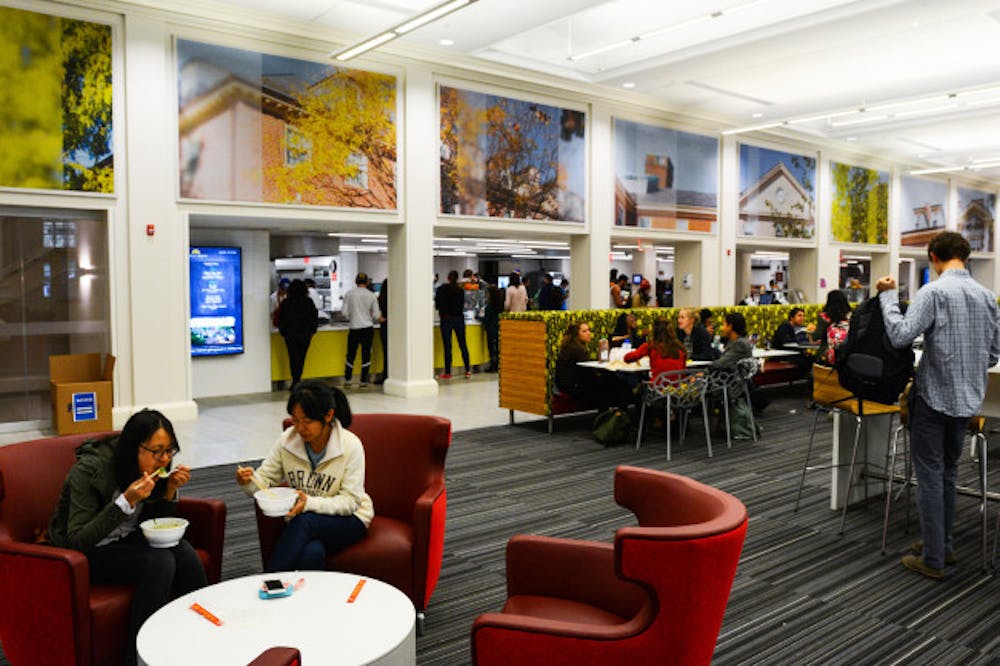To ease the burden of costs of attendance, the University will launch two financial aid initiatives starting fall 2018: a pilot textbook grant program for first-years who have no expected parent contribution in their financial aid packages, and greater scholarship amounts awarded to all students with no parent contribution to cover the full cost of a meal plan, Provost Richard Locke P’18 said. The “real cost of attendance” — expenses for necessities such as textbooks and meals, which students are expected to cover — has been a source of anxiety for many low-income students, Locke added.
The textbook payment program will allow eligible students to receive fully funded textbooks at the Brown Bookstore using a swipe card, Locke said. The additional scholarship funds will provide up to $3,000 more per student for those with the highest financial need to pay for a meal plan, said Chief of Staff to the Provost Marisa Quinn, a member of the working group that developed these measures. Beginning this fall, all first-years will be required to enroll in a full meal plan — either 20 meals per week or Flex 460 — while upperclassmen who receive additional funds under the new measure will retain full choice of meal plans, Quinn said.
Totaling around $2 million, these new financial aid measures aim to address the problem of food insecurity among students. Facing overwhelming expenses, many low-income students choose to either forego textbooks or downgrade their meal plan, Locke explained. After choosing a slimmer meal plan or no meal plan at all to save money, students may at times go hungry.
“For people to go hungry at one of the wealthiest universities is absurd,” said Jonathan Jaramillo ’18, a member of the University Resources Committee who worked closely with administrators and other students to develop the new financial aid measures. “When I have to focus my entire day on how I will eat, I cannot be a student anymore.”
By providing additional funds for high-need students, the University intends to ensure that no student is unable to afford a full meal plan. In turn, the increased scholarships will lower the amount these students are expected to contribute to their educational expenses through summer earnings and work study, Quinn said.
But Jaramillo expressed concern that the scholarship increase would be a “band-aid solution” to a larger problem — the motives that lead students to sacrifice food security for financial security in the first place. “A lot of students here are the breadwinners of their families,” Jaramillo said. Low-income students may choose to stint on meals to share money with family or save for emergencies. “That association between food and emergency money needs to be broken,” he added.
Though Jaramillo does not expect the scholarship increase to solve the underlying problems facing low-income students, “it’ll make sure students don’t go hungry while we study those root issues,” he said. “What gives me more hope is that the administration has promised to dig deeper into these issues in a nuanced manner.”
The University has established a new ongoing working group to continue to investigate and address students’ financial concerns, Locke said. The group, which will be co-chaired by the Dean of the College and the Vice President for Campus Life, is intended to create a systematic process for administrators to engage with students in allocating resources to meet their needs, Quinn said. The ongoing working group will also track the progress of the new financial aid measures after they go into effect next fall, Locke said.
Careful monitoring will be especially important to ensure the success of the pilot textbook grant program, Jaramillo said. This program may require fine-tuning to develop “a system that prioritizes student privacy and maximizes student accessibility,” Jaramillo added. So far, the program has only been approved as a trial run for the 2018-19 academic year, but Jaramillo said he is “incredibly optimistic” that the pilot program will be extended.
Jaramillo sees the new financial aid measures as a step toward an ideal situation where no student must pay for textbooks or a meal plan. While he believes more needs to be done to fully support low-income students, Jaramillo thinks the new financial aid measures prove the University is working to make its resources more accessible to all students.
Locke listed a number of additional financial concerns students have raised, including the cost of travel to and from home, the cost of laundry and a need for more flexible opening and closing dates for dorms and dining halls. “We have to look at their needs to and say, ‘What do we have to do to address them?’” he added.
The University is not alone in grappling with these issues. “Many other universities are wrestling with the same things,” Locke said. He pointed out that schools like Williams College have developed similar programs to make textbooks more accessible while other schools have addressed the problem of food insecurity by setting up food pantries. But by increasing scholarships to cover meal plan costs, “I think we’re probably ahead of most,” Locke added.

ADVERTISEMENT




